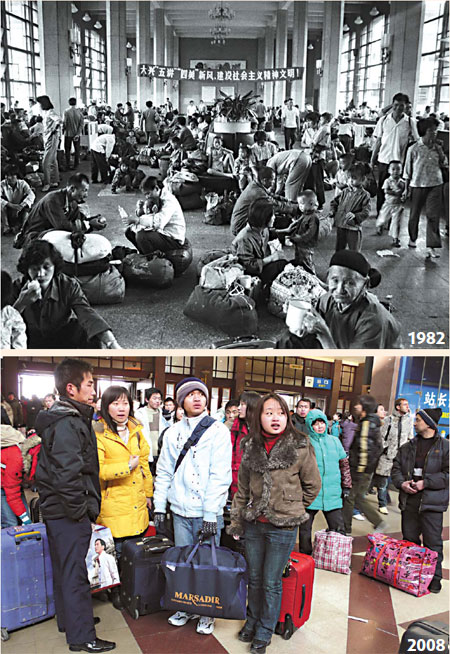
|
BIZCHINA> Wen's Lens
 |
|
Tracks of change
By You Nuo (China Daily)
Updated: 2008-12-29 07:48
 For the railway industry, some words and phrases essentially mean the same thing - be it development, modernization, reform or change. They all mean the job of carrying rural people into the cities - hundreds of thousands, time after time - to find new jobs, lives and homes.
Travel was costly and tiring. An average scene of the Beijing Railway Station, then the largest and most modern of the country (and still one of the largest), as in our 1982 black-and-white photo, shows no trace of the future trend. People from villagers and small cities just sat in ramshackle clusters on the lobby floor with simple luggage and home-made snacks. Despite the hanging propaganda banner to promote the so-called socialist spiritual civilization, some were sitting on the dirty floor littered with waste paper. Everybody was in a transient mood. They knew they were soon to go when the boarding whistle blew and this was not a place where they belonged. In fact, in 1982, the redistribution of collective farms to private management had yet to become a sweeping change. People were only beginning to make a little more income than the 1970s and could afford a few more colorful clothes. The phrase "market economy" was still taboo. Having millions of villagers leaving their farm jobs was something hardly anyone could have imagined. But as a result of the successful rural reform projects, first in Sichuan and Anhui provinces, then nationwide, the rise in farm productivity was able to raise a tremendous pool of labor for the industrial development in the cities. Nowadays, in many villages, farming is only reserved for the older people and providers of specialized services. All the young people (who would have been called "able-bodied farm workers") have gone to work in the cities, on fulltime or temporary contracts. In 2007, in an official survey, rural families reported at least 130 million of their members working on longer contracts in the cities - after some families had already entirely moved out of their old villages. The favorite destinations of many migrant workers are the large cities in the coastal and near-coast areas (such as Beijing). They want to stay in those cities. They want to be part of the modern China. Correspondingly, in the last 30 years, Beijing has built two more large railway stations - the Beijing West and Beijing South - with the one where our 1982 photo was taken still carrying the name Beijing Railway Station.
 (For more biz stories, please visit Industries)
|
主站蜘蛛池模板: 男女视频在线观看免费 | 波多野结衣在线看片 | 福利三区 | 思99re久久这里只有精品首页 | 日本在线看小视频网址 | 久久亚洲国产 | 国产成在线观看免费视频 | 国产精品日本欧美一区二区 | 国产精品久久久久久吹潮 | 黄色一级片网址 | 亚洲毛片免费在线观看 | 日本特黄特色免费大片 | 国产一区二区三区影院 | 岛国在线免费观看 | 黄色在线视频网 | 香港一级纯黄大片 | 2022国产精品手机在线观看 | 免费一级毛片免费播放 | 美女黄网站视频 | 国产三级观看 | 午夜精品免费 | 一级片免费观看视频 | 久久午夜国产片 | 精品国产日韩亚洲一区二区 | 亚洲国产精品线在线观看 | 国产欧美日韩成人 | 国产精品久久久久久影视 | 欧美综合自拍亚洲综合 | 成人毛片一区二区三区 | 小草青青神马影院 | 国产高清在线不卡 | 亚洲国产综合人成综合网站00 | 日本久久久 | 亚洲高清免费在线观看 | 久久精品国产一区二区三区不卡 | 久久久久国产精品免费免费 | 九九精品免费视频 | 亚洲 成人 欧美 自拍 | a级国产乱理伦片在线观看国 | 香港国产特级一级毛片 | 国产亚洲一区二区三区 |